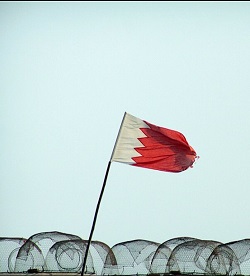13 March- The Bahrain Center for Human Rights (BCHR), Americans for Democracy and Human Rights in Bahrain (ADHRB), and the Bahrain Institute for Rights and Democracy (BIRD) condemn the recurring, violent attacks on prisoners at Jaw Prison. On 10 March 2015, Bahraini security forces allegedly attacked prisoners at Jaw Prison using rubber bullets, tear gas, and shotgun pellets. Leaked pictures from Jaw Prison show numerous injuries including several that seemed to be serious. The aforementioned organizations are seriously concerned over the wellbeing of the inmates at Jaw Prison, after this attack. Prison officials have since prevented families from calling and visiting their loved ones.
The incident allegedly started when a family protested after being denied visitation. The Ministry of Interior claimed that the family “damaged and vandalized the building.” A female relative of the family was arrested and detained. On the same day, detainees in buildings 1, 3, 4 and 6 called their relatives to tell them that security forces in large numbers were attacking them within the prison buildings and cells. They claimed that security forces fired tear gas and shotgun pellets inside cells which caused some prisoners to choke and suffer injuries of various degrees.
Numerous pictures and videos were leaked from Jaw prison and disseminated on social media websites. The videos showed the severity of the violence that was used against the prisoners. Pictures revealed a young man with a tear gas canister injury to his abdomen, another gentleman with a head injury, and several other pictures of cells filled with tear gas. Since the attack, there has been no news on the current condition of the injured prisoners. Some families, who had visits scheduled the following day, reported that they had been informed by the prison administration that visits and calls were canceled for the next three days.
It is important to note that buildings 3 and 6 of Jaw Prison house minors. This is not the first time prisoners, including minors, have been attacked. On 15 February 2015, security forces besieged buildings 3 and 6 and raided them with police dogs. The security forces physically beat juvenile prisoners with batons and used pepper spray, one prisoner was even bitten by a police dog. Following this attack inmates were also prevented from making calls and family visits had been canceled for several days after.
BCHR, BIRD and ADHRB are further concerned of the prison’s documented poor condition. Leaked pictures from the Prison show a lack of basic hygiene and over crowdedness. Although the prison’s capacity allows for 450 prisoners, it holds approximately 1000 prisoners. Many prisoners sleep in the corridors and in prayer rooms. Inmates protested and staged sit-ins demanding improvements, to no avail.
The security forces’ treatment of prisoners at Jaw Prison violates the “Standard Minimum Rules for the Treatment of Prisoners”, in particular Article 31 which states that “corporal punishment, punishment by placing in a dark cell, and all cruel, inhuman or degrading punishments shall be completely prohibited as punishments for disciplinary offences” and Article 32 (2) which ensures that no punishment “may be prejudicial to the physical or mental health of a prisoner” may be applied. In addition, the condition of the prison is in direct violation to Article 10 which states that every prisoner shall “be provided with a separate bed, and with separate and sufficient bedding which shall be clean when issued ..” and that “all parts of an institution regularly used by prisoners shall be properly maintained and kept scrupulously clean at all times.”
We, the aforementioned NGOs, call for:
1.) A thorough investigation into the attack at Jaw prison. We ask that the facts be presented and those responsible be held accountable for their actions.
2) The end to group punishment and administrative abuse on all accounts
3) All family members be given the right to have scheduled visitation and those scheduled visits be upheld by the prison administration.
4) Jaw Prison to provide an adequate and hygienic environment for detainees to sleep and be housed.





